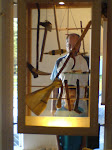Gör en hel plåt lasagne till lunch och kommande matlådor.
Fick intyg idag från en av våra större musikhögskolor på kurs (15 högskolepoäng), som jag avslutade juni 2006. De har så otroligt mycket att göra i administrationen så de skickar inte ut intyg/betyg automatiskt, utan man måste be att få ut handlingarna! Så har det aldrig varit förut… Den person som är ansvarig har varit sjukskriven för ”utbrändhet”…
Men att jag satte mig ner vid datorn nu var för att jag skulle vilja citera ur artikeln ”Psykoanalys som indoktrinering” ur tidskriften ”Impuls – Tidskrift för psykologi, nr. 3/2007, årgång 51 (s. 72-88), som jag fick mig kopierad i mejl (ur denna artikel, det nedan citerade finns i denna längre artikel en bit ner), där står (min översättning från norskan) i detta blogginlägg (inte i första hand skriva om mat och lunch och kursbetyg! :-)):
Se Miller igen i "Vägar i livet" kapitlet om Helga och de om guruer, t.ex. Hon kallar det som beskrivs ovan för (ren och skär) hjärntvätt. Men Miller menar också att vi troligen inte kan ändra en dålig terapeut och därför borde lämna denne/denna så snart som möjligt... Men detta är nog tyvärr svårare ju mer man behöver hjälp...Kanske mer om detta senare.”Det har sagts mig att en del människor efter lång tid i psykoanalys får problem med realitetstestning, därför att ingenting längre ser ut [att vara] som det det är. När relationen med terapeuten som en verklig person görs ogiltig, implicerar (innebär) det att oavsett vad en terapeut faktiskt säger eller gör, är detta utan betydelse. Varje negativ reaktion på terapeutens beteende tolkas som en projektion. Klienten kan inte längre lita på sina perceptioner/varseblivningar. Det svarar mot den form av verklighetsförvrängning och ogiltiggörande av erfarenheter som Axelsen (1997) påpekar är en starkt medverkande faktor till psykiska problem [!!!].
Det starka beroendet, som är en förutsättning för psykoanalytiskt orienterad behandling, kan ge grogrund för ett utsträckt bruk av maktutövande [dvs. till maktmissbruk, från i första hand terapeutens sida, men i förlängningen också utanför terapirummet, för att klienten blir så osäker på om hon/han ser rätt!?? Och också i värsta fall för övergrep i terapirummet av annan natur också, däribland sexuella i olika grader?]. /../
… ett mönster som ofta är identiskt med det klienten har upplevt tidigare i livet [är detta menar artikelförfattaren. Precis som växlingen mellan omsorg och straff, som författaren menar också kan ske i terapi i subtila former i form av accepterande och avvisning]. Det är knappast tillfälligt att det som i kommunikationsforskning definieras som kontrollstrategier (Wieman & Giles 1996) svarar mot psykoanalytiska behandlingstekniker som tystnad och undvikande av blickkontakt. På så sätt lär sig en klient snabbt vad som är acceptabelt att säga, mena och tro [det som Pia Melody kallar överdriven kontroll av verkligheten!? Vilket hon ser som en kränkning, av barnets integritet, och alltså faktiskt ser som övergrepp!!! Brist på respekt! Ibland allvarlig brist!], och vad som inte är det, och accepterar därmed analytikerns/terapeutens tolkningar och definitioner för att slippa avvisandereaktioner. För en psykoanalytiker kommer det alltid att handla om att göra och upprätthålla kontrollen med avsikten att upprätthålla auktoriteten [den autoritära, totalitära föräldern igen, men nu i ny skepnad, en som kanske är ännu svårare att genomskåda, för att det hela nu sker i ett sammanhang och med en person där man förväntar sig hjälp och räddning i och av, som Miller skriver en hel del om i sina böcker!? Och just därför kan bli ännu skadligare än ursprungstraumat t.o.m.!]. Detta ligger implicit/underförstått som en grundläggande premiss då det antas att klienten inte vet sitt eget bästa [”for your own good” gör terapeuten detta, han/hon vet bättre/bäst, har ”kunskapen”!!] och därför av alla krafter kommer att försöka manipulera terapeuten [!!!! Hemska tanke!!]. Det farliga i detta är att analytikern/terapeuten då kan förlora det som t.ex. Gullestad (1996) refererar till som ’den oberoende positionen’ (??).
När en klient får en ’negativ terapeutisk reaktion’ dvs. är missnöjd över att inte få den hjälp han eller hon behöver och därför slutar, är det i den psykoanalytiska traditionen alltid klienten det är något fel med, inte terapeuten eller terapin. Axelsen (1997) hävdar att terapeuter som har tagit avstånd från offerklandringstendenser ser klientens negativa reaktioner som terapeutens ansvar genom att terapeuten inte bemästrar sin del av samspelet i den terapeutiska relationen [så ser Miller det också!].
En psykoanalytiskt orienterad terapi kommer därför oftast att vara en ny form av uppfostran med stark prägel av det Alice Miller (1980) kallar ’den svarta pedagogiken’, en ny variant av ’identifikation med aggressorn’. Målet för behandlingen är att ersätta ett gammalt superego med ett nytt med hjälp av klassiska indoktrineringstekniker. Om en patient blir ’motstridig’ [börjar opponera sig] och insisterar på rätten till sin egen verklighet och nekar att godta terapeutens tolkningar, är det inte ovanligt att terapeuten ’ubevisst’ agerar ut sin egna föräldrar och tar samma uppfostringsmetoder i bruk mot patienten, som han själv blev utsatt för som barn (Miller 1981). Några av dagens analytiskt orienterade terapeuter använder beteckningen ’motstånd mot terapi’ om sådana patienter. ’Sund motståndskraft mot indoktrinering’ kanske andra skulle kalla det [ja, exakt!!!].”
Är de som borde vara det mest ägnade att hjälpa människor? Se också inlägget om "Hjälp till självdestruktion" och ur inledning till Kirkengens senaste bok i det senare inlägget.




























